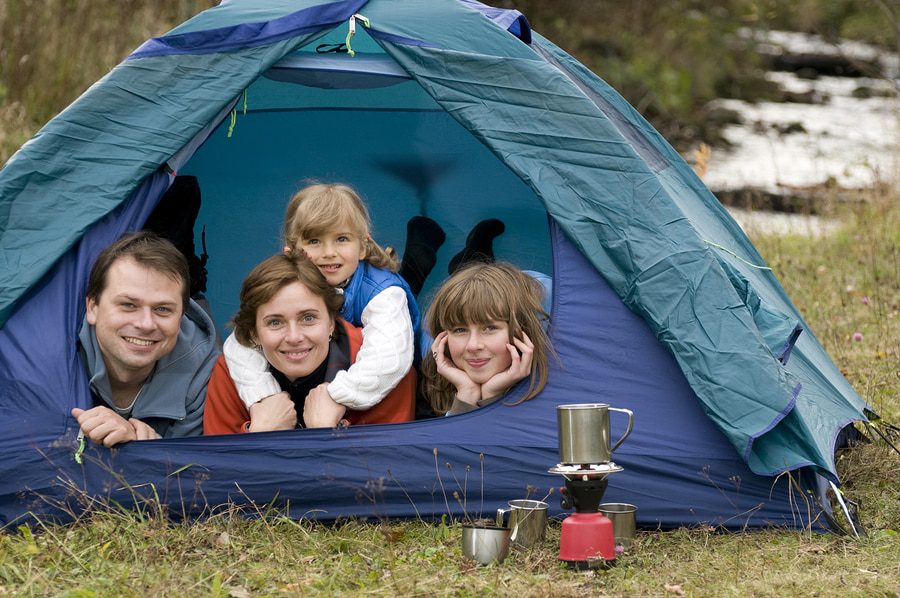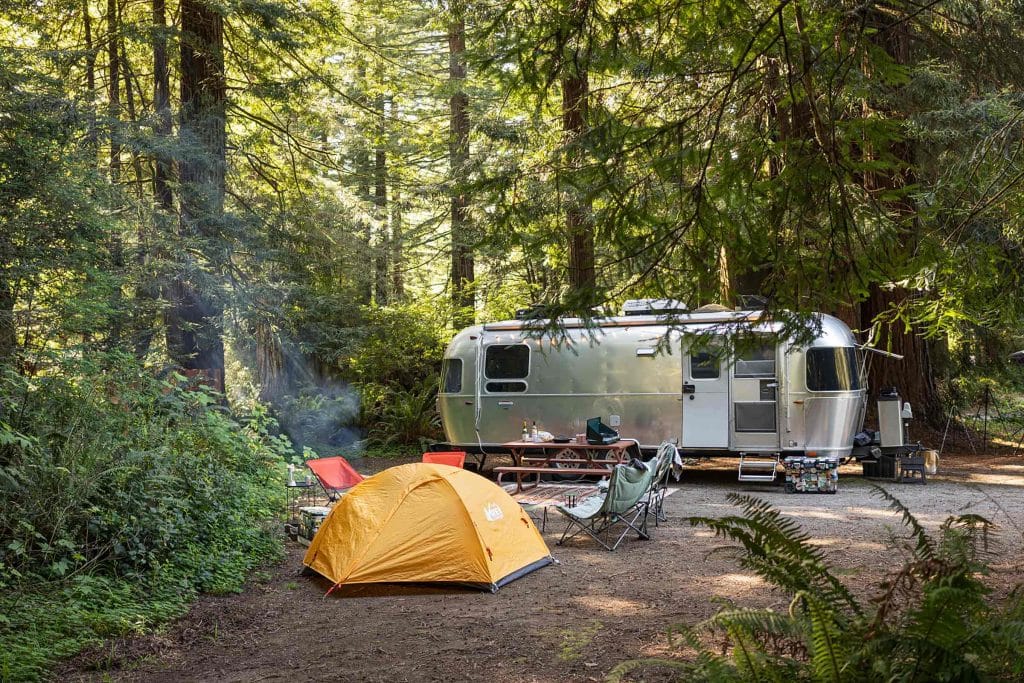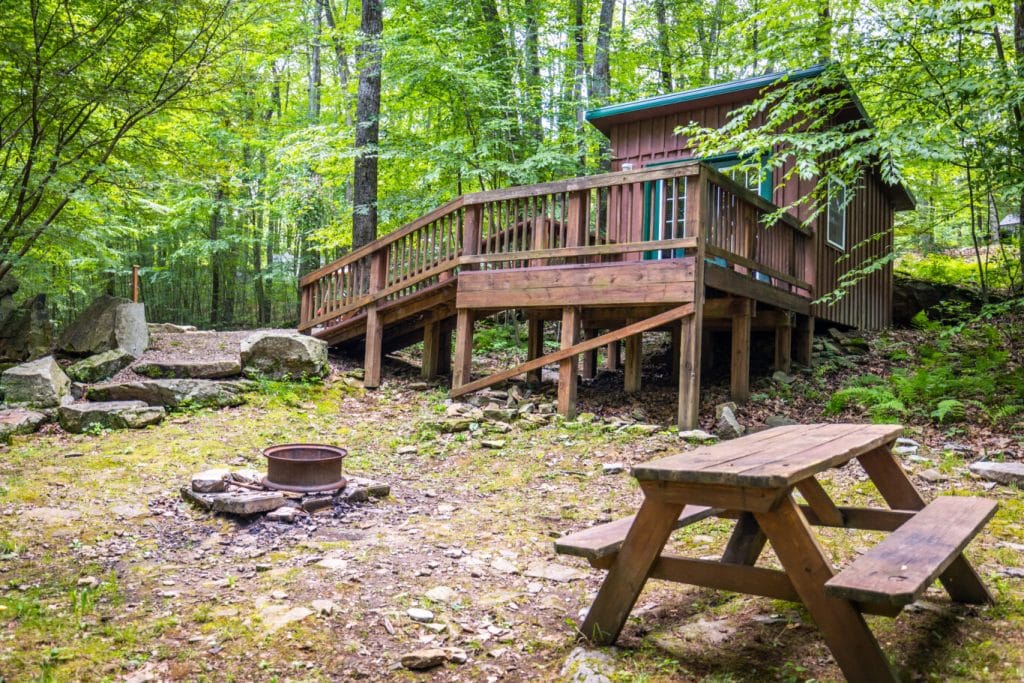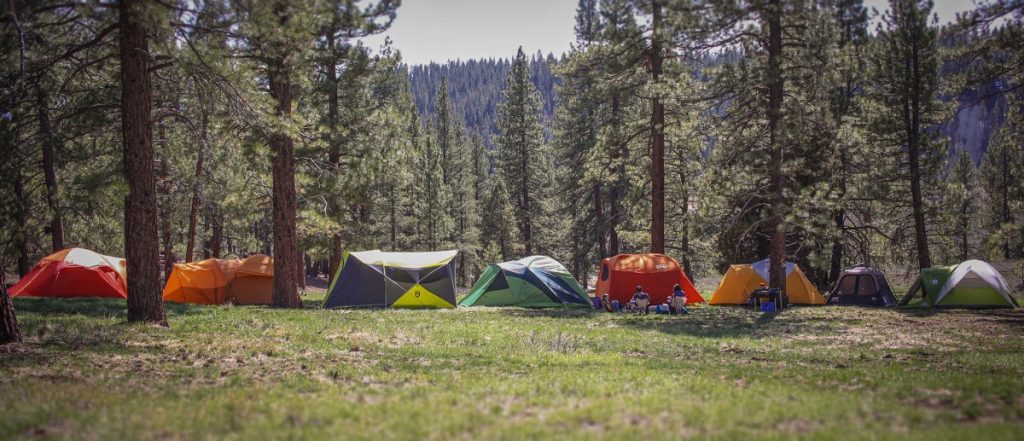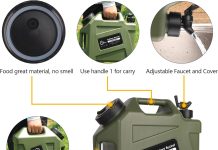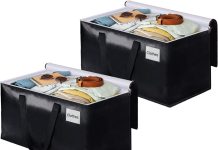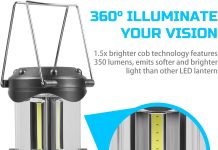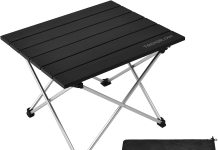When it comes to outdoor adventures, there are endless possibilities to explore. The question arises, however, of what type of camping accommodation is best suited for your needs. With options ranging from cabins to RVs to traditional tents, deciding between them can feel overwhelming. Fear not, for in this article, we will provide you with a helpful guide to choosing between cabin, RV, and tent camping. From the luxuries of a cabin to the freedom of an RV and the simplicity of a tent, we will delve into the pros and cons of each option to help you make an informed decision for your next camping excursion. So, let’s get started and discover which camping experience is truly perfect for you.
This image is property of www.sandhcampground.com.
Review contents
Pros and Cons of Cabin Camping
Comfort and amenities
One of the major advantages of cabin camping is the level of comfort and amenities it provides. Cabins often come equipped with beds, electricity, heating or cooling systems, and even kitchen facilities. This means that campers can enjoy a cozy and comfortable stay, especially during unfavorable weather conditions. Additionally, cabins often have access to restroom and shower facilities, providing a more convenient camping experience compared to other options.
Privacy
Privacy is another factor that makes cabin camping an appealing choice for many. Unlike tent camping, where campsites are usually in close proximity to each other, cabins offer a sense of seclusion, allowing campers to have their own private space. This makes cabin camping an ideal option for those who value their privacy or simply want to enjoy a quiet and tranquil getaway.
Cost
While cabin camping provides a higher level of comfort, it often comes with a higher cost compared to other camping options. Renting a cabin can be more expensive than tent camping or even RV camping. Additionally, some campsites may require an additional fee for cabin rentals. However, it is important to consider that cabins often come equipped with essential amenities, which can potentially save money on extra gear and equipment.
Limited connection with nature
One potential downside of cabin camping is the limited connection with nature. While cabins provide a comfortable and sheltered environment, they can sometimes isolate campers from fully immersing themselves in the natural surroundings. Some campers may miss the true outdoor experience of sleeping under the stars or waking up to the sounds of nature.
Advance booking
Because of their popularity and limited availability, booking a cabin in advance is often necessary. Especially during peak seasons, cabins can get reserved quickly, leaving little room for last-minute plans. This means that campers need to plan their trips well in advance and secure their cabin reservations, which may not suit those who prefer a more spontaneous camping experience.
Pros and Cons of RV Camping
Flexibility and mobility
One of the main advantages of RV camping is the flexibility and mobility it provides. With an RV, campers have the freedom to travel and explore different campsites and destinations without the need for constant unpacking and setting up. This allows for a more spontaneous and adaptable camping experience, as campers can change their location or itinerary as desired.
Comfort and amenities
Similar to cabin camping, RV camping offers a higher level of comfort and amenities compared to tent camping. RVs are equipped with various facilities such as beds, a kitchen, bathroom, and even entertainment systems. This provides campers with the convenience and comfort of a home away from home, making RV camping suitable for those who prefer a more leisurely and comfortable outdoor experience.
Cost
While RV camping provides convenience and comfort, it can also be more expensive compared to tent camping. The initial cost of purchasing or renting an RV can be significant, along with ongoing expenses such as fuel, maintenance, and insurance. Additionally, some campsites may charge higher fees for RV parking or hook-up facilities. It is important to consider these costs when deciding whether RV camping is the right choice for you.
Maintenance and fuel expenses
Another factor to consider is the maintenance and fuel expenses associated with RV camping. RVs require regular maintenance to ensure their safety and performance, which can incur additional costs. Additionally, fuel expenses can be significant, especially for larger RVs that consume more fuel. It is important to factor in these ongoing expenses when budgeting for RV camping.
Campground availability
While RV camping provides flexibility, it is important to note that not all campsites are equipped to accommodate RVs. Some campsites may have size restrictions or limited availability for RVs, especially during peak seasons. It is important to research and plan ahead to ensure that the chosen campsites have suitable facilities and availability for RV camping.
Pros and Cons of Tent Camping
Immersive nature experience
Tent camping offers a truly immersive nature experience. Sleeping under the stars, listening to the sounds of wildlife, and waking up to the fresh air are all part of the appeal. Tent camping allows campers to feel connected to the natural environment, making it an ideal choice for those seeking a more authentic and adventurous camping experience.
Affordability
Compared to cabin camping or RV camping, tent camping is often the most affordable option. The initial cost of purchasing camping gear, such as a tent, sleeping bags, and cooking equipment, is relatively low compared to the expenses associated with cabins or RVs. Additionally, campsites generally have lower fees for tent campers, making it a budget-friendly option for outdoor enthusiasts.
Flexibility in choosing campsites
Tent camping provides campers with the flexibility to choose a wide range of campsites. Whether it’s a well-established campground, a remote backcountry location, or a national park, tent campers have the freedom to explore and camp in various settings. This flexibility allows for a more diverse and adventurous camping experience.
Equipment and setup
One consideration for tent camping is the need for appropriate equipment and the setup process. Campers must invest in a quality tent, sleeping bags, cooking equipment, and other camping essentials. Additionally, setting up a tent requires some effort and practice, especially for first-time campers. It is important to familiarize yourself with the equipment and practice setting up camp before embarking on a tent camping trip.
Lack of amenities and comfort
While tent camping offers a more authentic and immersive experience, it often lacks the comfort and amenities provided by cabins or RVs. Campers must be prepared to rough it out with basic facilities and limited comfort. Restrooms and shower facilities may be shared, and campers must rely on portable stoves and makeshift cooking setups. It is important to assess your comfort level and willingness to forgo certain amenities before choosing tent camping.
Considerations for Choosing the Right Option
Level of comfort desired
When choosing between cabin, RV, or tent camping, it is crucial to consider the level of comfort you desire. If you prioritize comfort and convenience, cabin camping or RV camping may be the better option. On the other hand, if you are willing to sacrifice some comfort for a more immersive and adventurous experience, tent camping might be the perfect fit.
Desired level of privacy
Privacy is an important consideration when selecting a camping option. If you value privacy and seclusion, cabin camping or RV camping might be more suitable, as they offer separate living spaces. However, if you enjoy a communal and open atmosphere, tent camping allows for a closer connection with other campers and the surrounding nature.
Budget constraints
Everyone has different budget constraints when it comes to camping. Cabin camping and RV camping tend to be more expensive due to the added amenities and comfort they provide. Tent camping, on the other hand, offers a more affordable option with lower equipment and campground fees. Consider your budget and how much you are willing to spend on accommodations and camping gear.
Preference for outdoor activities
Your preferred outdoor activities can also influence your camping choice. If you enjoy hiking, fishing, or exploring remote locations, tent camping might be the best fit. However, if you prefer more leisurely activities such as reading or relaxing by the campfire, cabin or RV camping might be more suitable due to the added comfort and amenities they provide.
Ease of transportation
Consider the ease of transportation when choosing your camping option. Cabin camping generally requires less transportation logistics, as accommodations are already provided. RV camping provides the advantage of having a mobile living space, eliminating the need for setting up and taking down camp at each location. Tent camping requires transporting and setting up camping gear, which may be more time-consuming and physically demanding.
This image is property of campspot.blog.
Choosing Based on Seasonal Factors
Weather conditions
When choosing the right camping option, it is important to consider the weather conditions during your planned camping trip. Cabin camping provides protection from extreme weather conditions, making it suitable for camping during colder or rainier seasons. RV camping offers a similar advantage, as it provides a sheltered and climate-controlled environment. Tent camping may be more challenging during unfavorable weather conditions, but with proper gear and preparation, it can still be an enjoyable experience.
Availability of campsites
The availability of campsites should also be taken into account. Cabin camping often requires advance booking due to its popularity, especially during peak seasons. RV camping provides more flexibility, as many campsites offer RV parking spaces. However, it is still important to research and book campsites in advance to ensure availability. Tent camping generally has more availability, as it does not require specific accommodations, but popular campgrounds and national parks may fill up quickly.
Access to facilities and attractions
Consider the accessibility of facilities and attractions when choosing your camping option. Cabin camping often provides easy access to restroom and shower facilities, making it more convenient. RV camping offers the advantage of bringing your own facilities on wheels. Tent camping may have shared facilities or require more effort in finding suitable locations for sanitation. Consider your preferences for comfort and convenience when evaluating the accessibility of facilities and attractions.
Preference for outdoor activities
Different camping options cater to various outdoor activities. Cabin camping often provides easy access to amenities such as swimming pools, hiking trails, and organized activities. RV camping allows you to easily explore various outdoor activities and destinations due to its mobility. Tent camping offers the most flexibility in terms of outdoor activities, as it allows you to immerse yourself in nature and explore remote locations. Consider your preferred outdoor activities and how each camping option aligns with them.
The Importance of Planning and Preparation
Researching campsites and amenities
Regardless of the camping option you choose, planning and research are essential. Take the time to research different campsites, their amenities, and any specific rules or regulations they may have. This will help you determine which campsite best suits your needs and preferences.
Making reservations
If you decide to go for cabin or RV camping, making advance reservations is vital. Many popular campsites have limited availability and can fill up quickly, especially during peak seasons. Plan ahead and make your reservations well in advance to secure your desired dates and accommodations.
Packing appropriate gear and supplies
Ensure that you have the appropriate gear and supplies for your chosen camping option. For cabin camping, pack essentials such as bedding, toiletries, and any additional items you may need. For RV camping, stock your RV with necessary supplies, including food, cooking utensils, and camping gear. For tent camping, pack a sturdy tent, sleeping bags, camping stove, and all the necessary equipment to ensure a comfortable camping experience.
Preparing for emergencies
Emergencies can happen even during a camping trip. Make sure you are prepared by packing a first aid kit, emergency contact information, and any necessary medications. Familiarize yourself with basic first aid procedures and know how to handle common camping-related emergencies.
Understanding camping regulations and etiquette
Every campsite has its own rules and regulations that should be followed. Familiarize yourself with these guidelines and ensure that you adhere to them during your camping trip. Additionally, practice good camping etiquette by respecting other campers, minimizing noise, and leaving the campsite in the same condition you found it.
This image is property of roadville.com.
Tips for First-time Campers
Start with a basic camping experience
If you are new to camping, it is best to start with a basic camping experience. Choose a campsite that offers amenities and facilities that align with your comfort level. This will help ease you into the camping experience and allow you to become more familiar with the essentials before venturing into more challenging camping options.
Rent or borrow gear before investing
Before investing in camping gear, consider renting or borrowing equipment. This allows you to try different camping options without committing to expensive gear upfront. It also gives you the opportunity to assess your preferences and comfort levels before making a significant investment.
Practice setting up and breaking down camp
Setting up and breaking down camp can be time-consuming, especially for new campers. Practice setting up and breaking down your camping gear before your trip to familiarize yourself with the process. This will save you time and frustration when you arrive at the campsite.
Learn survival skills and safety precautions
While camping is generally a safe activity, it is important to learn basic survival skills and safety precautions. Familiarize yourself with fire safety, navigation skills, and basic first aid. Additionally, understand the potential risks associated with wildlife encounters and how to minimize them.
Be flexible and adaptable
Camping is an adventure, and things can often go differently than planned. Embrace the spirit of flexibility and adaptability while camping. Weather conditions may change, campsites may not meet expectations, or equipment may malfunction. Being flexible and adaptable will allow you to make the most of your camping experience and overcome any obstacles that may arise.
Factors to Consider for Family Camping
Safety and security
Safety should be a top priority when camping with the family. Choose campsites that have adequate security measures and are known to be family-friendly. Ensure that the campsite is well-lit at night and has designated areas for children to play safely.
Child-friendly amenities and activities
When camping with children, it is important to consider child-friendly amenities and activities. Look for campsites that offer playgrounds, swimming areas, or organized activities for kids. This will keep them entertained and engaged throughout the camping trip.
Space and accommodation options
Family camping often requires more space and accommodation options. Consider campsites that offer larger camping areas or cabins that can comfortably accommodate your entire family. This ensures that everyone has enough space to relax and enjoy their time in nature.
Accessibility to facilities
When camping with the family, accessibility to facilities is important. Look for campsites that have easily accessible restrooms, showers, and potable water sources. This will make the camping experience more convenient and enjoyable, especially for families with young children.
Catering to different age groups
Consider the needs and preferences of different age groups within your family. Older children may enjoy more adventurous outdoor activities, while younger children may require more attention and supervision. Choose a camping option that caters to the varying interests and abilities of each family member.
This image is property of u7q2x7c9.stackpathcdn.com.
Eco-Friendly Camping Options
Leave No Trace principles
When camping, it is important to follow the principles of Leave No Trace. This means minimizing your impact on the environment by properly disposing of waste, reducing noise pollution, and respecting wildlife and vegetation. Leave your campsite as you found it, ensuring that you leave no trace behind.
Choosing eco-friendly accommodation
Consider eco-friendly accommodation options for your camping trip. Look for campsites that prioritize sustainability and practice environmentally friendly measures. This can include using renewable energy sources, recycling facilities, and minimizing water usage.
Reduce, reuse, and recycle
Minimize waste during your camping trip by practicing the three R’s: reduce, reuse, and recycle. Bring reusable water bottles, food containers, and shopping bags to minimize single-use plastic waste. Separate recyclables from general trash and dispose of them properly.
Conserving water and energy
Practice water and energy conservation during your camping trip. Use water sparingly, taking shorter showers and turning off faucets when not in use. Use energy-efficient lighting and turn off lights and electronic devices when not needed. This will help reduce your environmental footprint during your camping experience.
Supporting local conservation efforts
Support local conservation efforts by choosing campsites or organizations that actively contribute to environmental preservation. This can include donating to conservation initiatives, volunteering for clean-up activities, or participating in educational programs. By supporting these efforts, you can help protect and maintain the natural beauty of camping destinations for future generations.
Conclusion
Choosing the right camping option depends on individual preferences, comfort levels, and budget considerations. Cabin camping offers comfort and amenities, with the downside of limited connection with nature and requiring advance booking. RV camping provides flexibility and mobility, but comes with higher costs and maintenance requirements. Tent camping offers an immersive nature experience and affordability, but lacks amenities and requires proper equipment and setup.
Considerations such as level of comfort desired, desired level of privacy, budget constraints, preference for outdoor activities, and ease of transportation are important when choosing the right option. Seasonal factors, including weather conditions, availability of campsites, access to facilities and attractions, and preference for outdoor activities, also play a crucial role in decision-making.
Planning and preparation are essential for a successful camping trip, including researching campsites, making reservations, packing appropriate gear, preparing for emergencies, and understanding camping regulations and etiquette. For first-time campers, starting with a basic camping experience, renting or borrowing gear, practicing camp setup, learning survival skills, and being flexible are helpful tips.
Factors to consider for family camping include safety and security, child-friendly amenities and activities, space and accommodation options, accessibility to facilities, and catering to different age groups. Eco-friendly camping options such as following Leave No Trace principles, choosing eco-friendly accommodation, reducing, reusing and recycling, conserving water and energy, and supporting local conservation efforts contribute to environmentally conscious camping practices.
In conclusion, the best camping option is subjective and depends on personal preferences, budget, and desired camping experience. Consider all the factors and make an informed decision to ensure a memorable and enjoyable camping trip.
This image is property of u7q2x7c9.stackpathcdn.com.


